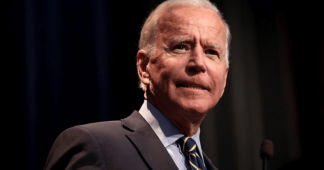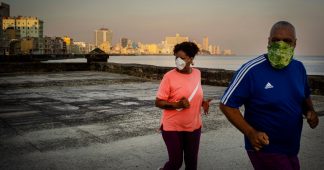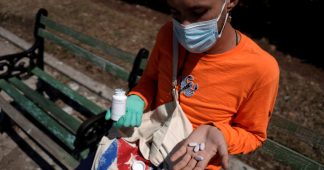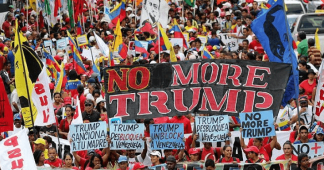B Posted on
With Russia’s invasion of Ukraine, calls have rung out from every corner of the U.S. foreign policy establishment for measures to be taken in retaliation against Russia’s aggression. The initial response made by the United States was little surprise to anyone: the announcement of sanctions against Russia. In the modern age, sanctions have become the go-to tool to use against rogue states who find themselves on the wrong end of the American-led geopolitical world order. Hit their country with sanctions, and then hope that the economic pain forces them to reconsider their course of action. That’ll show em!
Sanctions are, more than anything else at this point, a mindless knee-jerk reaction. They have become so commonplace that questions surrounding their efficiency or morality aren’t even asked, much less answered. It is taken as a given that in all geopolitical crises, the United States must do something. War is messy, but sanctions are easy and cheap! They don’t require any active effort, they make a strong statement, and looks good on the news. After all, we can’t just sit back and do nothing!
Despite this popular perception, sanctions have massive repercussions on the lives of ordinary people that just so happen to be living under the “wrong government”. In theory, they are aimed at governments. In practice, they always end up hitting the people. When countries are cut off from international trade, they lose access to imports of goods they are dependent upon. This leads to shortages, high prices, recessions, and an abundance of difficult choices for the domestic population. These economic disturbances are not just a mild inconvenience, but malicious and destructive to all aspects of their lives.
A few case studies can sharply illustrate the real and tangible impact of sanctions:
Cuba
Ever since Cuba’s Communist revolution in 1959, the relationship between it and the United States has been tumultuous, to say the least. When the US backed Batista government was overthrown, the prospect of a communist country just miles off the coast of the US mainland during the spooked many US lawmakers. The result was the 1961 Foreign Assistance Act, which forbid any form of assistance to communist countries and imposed a total embargo on Cuba.
Because of plentiful assistance from the Soviet Union, Cuba’s economy was able to withstand the economic pressure from the US for several decades, experiencing roughly 2% growth per year. However, when the Soviet bloc collapsed, so too did Cuba’s economy. The American Journal of Public Health found that post-1989 the value of Cuba’s imports, which its economy was heavily dependent upon, decreased from $8 billion to $1.7 billion. To make matters worse, the US embargo was tightened in Cuban Democracy Act of 1992 through further restrictions on other nation’s trade with Cuba.
The first several years of the 1990s were turbulent for the Cuban economy. In a 2001 study by the US Trade Commission, they found that by 1994, Cuba’s real GDP had dropped by 40% from 1989, and agricultural production had decreased by 54%. The aforementioned American Journal of Public Health recorded that during the 1980s, half of all protein and calories for human consumption were imported into the country. From 1989 to 1993, imports of these foodstuffs declined by half. As a consequence, protein and caloric availability dropped by 25% and 18% respectively. Much of the imports coming into Cuba that were lost were medical and health related. The loss of these goods led directly to an increase in mortality in the Cuban population aged 65 and older by 15%. Cases of tuberculosis in the population increased threefold, deaths to infection and parasites increased by 67%, and deaths due to influence increased by 77%.
Through a series of reforms and moderation of communist economic policies, Cuba’s economy managed to recover by the end of the decade. Even so, the country remains relatively poor. It boasts a GDP per capita of $9,099, roughly one-seventh of the United States. The Biden administration is yet to lift any major sanctions from Cuba, signaling no change from the last 60 years of economic pressure on the country. For the foreseeable future, the US will continue to keep its thumb on Cuba.
Iraq
During the same period that Cuba was experiencing the worst of its economic woes, another country on the wrong end of the United States’ ire was also suffering under onerous sanctions: Iraq. When Saddam Hussein invaded Kuwait in 1990, the United States led a coalition into Kuwait against the Iraqi army in what would come to be known as First Gulf War, or Operation Desert Storm. The Iraqi army was soundly defeated, Kuwait was liberated, and it all looked good on camera to boot. After the war, heavy sanctions were placed on Iraq with the hope of regime change against Hussein to remove him for good.
During the war, the country of Iraq itself had been subject to US air attacks, which crippled the civilian infrastructure within the economy. In a report from The New England Journal of Medicine, only two of the Iraq’s twenty electricity-generation plants were still operational by the end of the war. This lack of electricity had a spiraling effect on the rest of the country. Water purification plants, which required electricity to operate, ground to a halt. Sewage systems throughout the country were also paralyzed. Much of this damage was irreparable, and what could be repaired would take months and years.
The damage done to Iraq, in addition to the burdensome sanctions levied against the country, led directly into a humanitarian crisis. The World Health Organization, or WHO, conducted a study in 1996 which contained horrifying revelations as to the conditions on the ground within the country. Food shortages were rampant, with the country only receiving 25% of the needed red meat and poultry, 40% of cereals, 10% of fish, and 10% of sugar. Overall availability of calories decreased by 65%. They designated the diet of the Iraqi general population as being “semi-starvation”.
This lack of sufficient nutrition greatly impacted health and well-being, especially in children. The WHO cites internal research done in 1995 that found 28% of children in Baghdad had stunted growth, 29% were underweight, and 12 were wasting. Given that these were the conditions in the capital city, we can surmise the situation was even more dire in the outside provinces. In total, the mortality rate for children increased sixfold over the pre-war period. Diseases, such as Typhoid, Cholera, and Malaria, were all at epidemic proportions, diseases to which children were particularly vulnerable.
Nobody is quite sure how many people were killed as a result of the sanctions. An infamous report from the UN in 1995 claimed that 500,000 children had been killed, which led to an even-more infamous moment in a “60 Minutes” interview, but this number has been called into question. The number of children killed is still certainly somewhere in the hundreds of thousands, with a conservative estimate being around 300,000 children killed.
US sanctions on Iraq persisted until the invasion of the country in 2003, at which point the Iraqi people had to endure eight long years of conflict and civil war that had been foisted upon their country. It was only several years after the American withdrawal in 2011 that ISIS invaded and occupied parts of Northern Iraq, which required several more years of war to expel them fully from the country. Only now, decades later, Iraq has the chance to begin to rebuild after decades of turmoil and despair.
Venezuela
In 1998, Hugo Chavez was elected as the president of Venezuela on a nationalist and socialist platform. In the following years, he implemented a litany of economic and political reforms with the goals of redistributing wealth, alleviating poverty, and nationalizing many areas of industry. The first sanctions placed by the United States on the country was in 2006, under the pretense of a failure to comply with the US’ anti-terrorism efforts. These first sanctions were relatively minor, but would be far from the last imposed upon the country.
Venezuela’s economy was and is largely based off of exporting oil. As long as the price of oil was relatively high, the government had plenty of money for its social programs. However, beginning in mid-2014 the price of oil began to decline, which led to an economic crisis. As Venezuela’s economy crashed, sanctions upon the country ramped up. In 2014, Congress passed the “Venezuela Defense of Human Rights and Society Act of 2014”, which levied sanctions on specific individuals within the Maduro government. The Trump administration took a very hard line towards Venezuela, casting new rounds of sanctions in 2017, twice in 2018, 2019, and 2020.
The combination of Venezuela’s collapsing economy and sanctions pushed the country into economic freefall. One of the most visible symptoms has been hyperinflation, which has thoroughly destroyed the value of the Bolivar. As of this writing (March 2022), one US Dollar is worth over 428,000 Bolivars. In 2014, one Dollar was equal to roughly 6 Bolivars. The worst year of inflation was 2018, where inflation was over 65,000% annually.
The crisis is far more widespread than just in the monetary realm, however. GDP per capita has plummeted by 87% over the decade from 2011-2021. Venezuela relies heavily on imported food products, with roughly 75% of its foodstuffs being imported into the country. The available of these goods has dropped precipitously, as imports into the country had dropped by 82% over 2010-2020. This has all resulted in massive shortages of essential goods for the Venezuelan people. The Food Security Information Network (FSIN) reports that one-third of the population was food insecure, meaning they were unable to meet their caloric needs on their own. 60% were moderately food secure, meaning they could afford food as long as they went without other basic necessities. The rise in prices for goods was also accompanied by a drop in incomes: 37% responded to a FSIN survey stating that they had lost all of their income in the economic collapse, and 51% had lost a portion of their income.
The health of the Venezuelan people has diminished greatly in conjunction with the economic crisis. A study conducted by three Venezuelan universities that found an overall 31% increase in total mortality from 2017 to 2018 alone. Essential medicines were available at only 15% of the required stocks. Children have been greatly affected as well, with a UN study finding that 22% of children under five are experiencing stunted growth.
Venezuela’s economy as continued to decline year-after-year, and is showing no signs of halting its impoverishing decline. The Biden administration has shown no signs of easing any of the sanctions placed by the Trump regime, indicating that little chance for respite for the Venezuelan people. The principal question at this juncture is how long the collapse can continue, and how much more suffering the Venezuelan people can endure.
Conclusions
While only a small sampling, these instances show the consequences that sanctions bring. While not often seen, acknowledged, or felt by the imposers, they hurt and affect real people. Even if they aren’t intended to hurt innocent civilians, their effects are clear, regardless of the stated intentions. Will Russia suffer the same dismal fate as Cuba, Venezuela, or Iraq? Likely not, but a squeeze upon the Russian people will be felt all the same. Sanctions are often thought of as merely an ordinary and insignificant piece in the game of foreign-policy. On the contrary, sanctions are a form of war; specifically, economic war. Every war has sacrifice, and in an economic war it will be the people, not the government, soldiers, or oligarchs, who will ultimately pay the price.
* J.W. Rich is an economics student in Charlotte, North Carolina. His interests are in economic theory and the history of economic thought. His work can be found on his blog at thejwrich.medium.com.
Published at original.antiwar.com
We remind our readers that publication of articles on our site does not mean that we agree with what is written. Our policy is to publish anything which we consider of interest, so as to assist our readers in forming their opinions. Sometimes we even publish articles with which we totally disagree, since we believe it is important for our readers to be informed on as wide a spectrum of views as possible.











